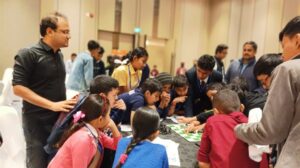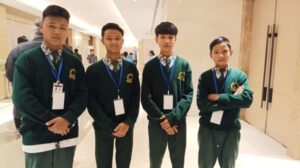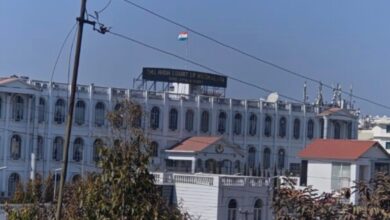Meghalaya chess arena: Growing in 64 squares
The game is gaining popularity in the state as a sport and is being encouraged among students to improve overall academic performance

When the British were annexing the Kingdom of Awadh and Nawab Wajid Ali Shah was turmoiled, his two aristocrats, Mirza Sajjad Ali and Mir Raushan Ali, remained unperturbed and chose to immerse themselves in chess (film: Shatranj Ke Khilari, Satyajit Ray). For them, the chequered board was a bigger battlefield than standing up to the foreign troops.
Such is the addiction to chess that makes an ardent player forget about the trivialities of the world around them. One can witness that immersive game environment right in the city. Of course, it is not a battlefield for the players but a way of life.
Meghalaya is growing into a hub of chess and the arena at one end of Lady Hydari Park (Phan Nonglait Park) gives a glimpse of the bigger picture.
The arena

The chess arena at Lady Hydari Park was set up two years back and is one of the four in the state. The other three are on the campus of NEHU Shillong, in Tura (West Garo Hills) and Baghmara (South Garo Hills). Though the arena in the park is open on all days and to everyone, most players come between 2.30 pm and 5 pm on Sundays.
There are around 10 chess boards imprinted on tables attached with two seats. Players are advised to bring their chessmen but the pieces are also provided to them.
Raktim Suraj, a medical student, was busy making the right move against his opponent, 13-year-old Sebastian Kurbah, when Sunday Monitor spotted him in the arena. Suraj has been playing chess for the last 10 years. He helps the young players perfect their moves and also keeps an eye on visitors to the park so that they do not use the game tables as an eating space.
Jebeswar B. Marak (13) and his twin sisters, Peacyworld and Gracyworld, are regular players. All three siblings got into chess for their father, Moni J. Sangma. Jebeswar’s opponent Nilabh Chaudhuri (11) started playing chess in school. “We have a chess club at St Anthony’s (St Anthony’s Higher Secondary School). I enjoy the game and come to the park every Sunday,” said the young player as he took a break from the game.
For cousins Rounak Thakur (11) and Siddharth Kumar (13), the game started at home when the former’s father, Chandan Thakur, bought them chess boards. While Rounak started playing in 2023, Siddharth got hooked on chess six months back. Now, they come to the arena every weekend to hone their skills.
The encouragement
Chess is not new to Meghalaya. Though the state does not have an international master, it has several rated players. The highest-rated player so far is Gilford Thangkhiew (2076), followed by Khrawkupar Pajat (2019), who is also the general secretary of the Meghalaya Chess Association (MCA), and Silkam Sangma (1822).
The MCA, set up in 1975, has been doing its part in nurturing good players. The association became non-functional for a few years in the nineties and was revived in 2001. Since then, it has been sending players to national tournaments every year. The state has nine district associations, including three in Garo Hills. Last April, MCA organised its first rating tournament for the northeastern region. The same year it organised the International Grandmaster Tournament.
The Garo Hills Chess Association organised the 47th Meghalaya FIDE Rated Chess Championship 2024 in June. Recently, chess workshops for trainers and players were also organised in the city.
These local tournaments and workshops are encouraging children, not only from Shillong but also from rural areas, to show a keen interest in the game.
“We had about 180 participants in the workshop and they came from all over the state. There were many applications but we could not accommodate all. Thirty-four trainers affiliated with MCA were also part of the workshops. The response is overwhelming,” said KM Warjri, president of MCA.
Besides, encouragement has also come from the state government. In March this year, the State Council of Science, Technology and Environment (SCSTE), in collaboration with MCA, launched a programme at the school level called the ‘Queen’s Gambit’. Under this, MCA coaches will visit schools to provide training based on the ‘Chess in Schools’ syllabus developed by the All India Chess Federation.
“We have reached out to more than 300 schools across the state. We shared this idea with Sagar Shah (international master) and he was instantly interested. Despite his busy schedule he agreed to invest more than 10 hours each to the workshop in the city. I hope this has benefited students and will benefit chess in Meghalaya,” said Gunanka DB, SCSTE project director.
“Shah is so enthusiastic about the idea that he is ready to bring (grandmaster) Viswanathan Anand to the state,” added Gunanka.
Swapnil Tembe, the director of School Education in Meghalaya, is one of the patrons. He was the first to set up a chess arena in Tura in 2022 when he was the deputy commissioner of West Garo Hills.
“There would be tournaments in the past too but those were not rated. For rated tournaments, players went to Guwahati. Now, the state government is helping MCA hold rated tournaments to help players improve themselves,” said Tembe, who started playing chess during the pandemic.
The experts
International master Shah — the founder of ChessBase India, the biggest chess news portal — visited Tura last year and was impressed by the chess arena and the interest of the local youths in the game.
“I met a few children and they loved chess. However, I found that there was not much direction to their enthusiasm, and to do that, you need a strong federation and sponsorship. Meghalaya has a strong chess association and government support, and these are strong elements. The state now has a school programme too. This means that the base of the players will widen over time. Maybe in another five years, the state will have a national champion and in 10 years a grandmaster,” said Shah on the sidelines of the Queen’s Gambit workshop in the city.
Meghalaya chess players may see the IM frequently as Shah said he would ensure that the Queen’s Gambit programme, which is “extremely ambitious and one of its kind”, continues. “It is difficult to launch and execute such a programme on such a large scale. And yet, all the trainers came together to make it possible,” he added.
WIM Amruta Mokal, who is the COO of ChessBase India, and FIDE-rated player and lawyer Priyanka Ved were accompanying Shah.
This was Mokal’s first visit to Meghalaya and she was surprised to see the huge participation in the workshop. “We had some intense sessions with coaches here. I was amazed to see everyone’s energy level. All were so engrossed even towards the end of the sessions. You really have to love the game to be so involved,” Mokal told Sunday Monitor.
Shah and Mokal quit playing in 2014 and dedicated themselves to spotting talents. They started travelling across the country in 2017 to understand the chess scenario in India, especially in rural areas.
“We interviewed Vaishali (WGM Vaishali Rameshbabu) and Prag (GM Rameshbabu Praggnanandhaa) in 2014 and we instantly knew they were super-talented. It is heartening to see them grow over the years,” Mokal recollected.
When the pandemic struck in 2020 and continued its onslaught for the next two years, Shah and Mokal got busy promoting the game online. The former made several training videos, which became viral and encouraged many to take up chess.
“We also tried to make chess education materials, such as books and software, accessible to Indian players at affordable prices. Here at the workshop, we are distributing training sheets for players to solve. This way we can create a strong base… If we spot talents here, we will ensure that they get dedicated trainers and can participate in more tournaments,” Mokal informed.
Besides the experts from Mumbai, the local trainers are also doing their part in nurturing talents in Shillong, on its outskirts and in rural areas. One such dedicated coach is Mukul Bhandari, a filmmaker by profession, who settled in Pynursla from Delhi three years back. Bhandari travels through villages and asks parents to send their children for chess training.
“I have been playing for over a decade but I improved after I started visiting the arena in the park. Now, I teach chess in five schools in Pynursla. Many parents have shown interest over the years,” Bhandari told Sunday Monitor.
Chess & education

Chess for some is a way of overcoming stress and improving concentration. Many play the game simply for the love of it. For seven-year-old Iaphibansara, chess was a game-changer.
The orphan lives with her ailing grandmother at Rangbihbih near Pomlakrai. She would not speak to anyone and barely responded in school. In April this year, she participated in a small workshop along with 10-12 children.
“Initially, she would not make a move. So, everyone egged her on to make her move on the board, and she did amid cheers. She has become a different person since then. Now, she plays with everyone and loves chess,” said Bhandari as he pointed at the young player running around the hall room. “She has already finished solving seven sheets,” he added.
Miracle? One could say, but it has been scientifically proven that chess helps in brain development in children. A particular study says parents “considered that chess helped their children develop positive emotions and helped them overcome negative emotions”.
“Educators consider utilizing the game of chess as an instructional strategy to stimulate intellectual processes such as attention, memory, concentration, creativity and reasoning (Krogius, 1972), or to reinforce skills as concentration, problem identification, problem-solving, planning strategies, creativity and lucid thinking for students with SEN (Storey, 2000),” says another 2014 study.
According to Gunanka, chess will help children in Meghalaya improve their cognitive skills and perform better in science and mathematics which have seen poor results in the past years.
Improving the overall performance in science and mathematics at the school level in the state has prompted the Education Department and SCSTE to be part of the endeavour to encourage chess among children.
Amit Saraf, president of Rotary Club Shillong, was introduced to chess by his father and “I took it as a fish takes to water”. Saraf became the Meghalaya state champion last year.
“I love the game. Chess is super-creative and no game is the same. It helps improve memory, critical thinking and problem-solving capabilities. It helps in studies as the neurons start firing as one thinks of creative solutions and all the puzzles,” said Saraf.
Advitiya, Gunanka’s eight-year-old son, impressed the experts at the workshop with his skills. He completed the puzzle-solving sheets before all participants and went around the hall room helping friends and other players.
Iairisha Tympuin and her sister Elizabeth were introduced to chess by Bhandari five months back. “We knew nothing about chess. The first time when I saw the board and listened to the explanation, I got so tense that I fell sick. But now I want to know more about the game. I am also teaching chess to children in our village (Rangbihbih),” said Iairisha.
The challenges
True, the chess arena in Meghalaya is growing. However, challenges remain for all stakeholders. For MCA, the biggest challenge is funding.
“We get Rs 3 lakh annually from the government. This is a meagre amount. The tournaments and workshops require a lot of money. We need to provide accommodation and food to participants,” said MCA president Warjri.
Unlike other states, Meghalaya lacks sponsorship which discourages talented players from rural areas from participating. There should be more awareness from the government so that potential sponsors can be tapped.
For trainers, the challenge is to upskill themselves. “But this may be hindered if there is no channel for livelihood. So, that has to be kept in mind. Having said that, I feel the lack of resources made them and the kids more focused. If this sustains, then Meghalaya will see some strong players,” said Shah.
It is also a challenging task for stakeholders to convince parents in rural areas to send their children for chess training. Most of them do not know about the game and “they think that their children will not be able to learn”.
“Parents do not understand the value of chess. I invited 18 children but only a handful came. Some gave the excuse of household work and some parents said that children would be kidnapped. The mindset has to change drastically,” said Iairisha.
The mindset surely needs to change and the Department of Education can help in spreading the awareness. If all stakeholders work in tandem, then the state will not only produce great players but will see a drastic improvement in academic performance at the school and college levels.
~ Team Sunday Monitor





